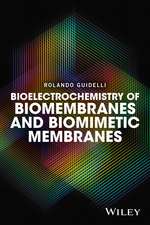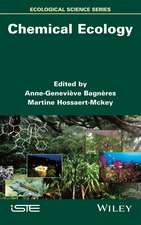Toward a History of Epistemic Things: Synthesizing Proteins in the Test Tube: Writing Science
Autor Hans-Jörg Rheinbergeren Limba Engleză Paperback – 30 iun 1997
In this powerful work of conceptual and analytical originality, the author argues for the primacy of the material arrangements of the laboratory in the dynamics of modern molecular biology. In a post-Kuhnian move away from the hegemony of theory, he develops a new epistemology of experimentation in which research is treated as a process for producing epistemic things.
A central concern of the book is the basic question of how novelty is generated in the empirical sciences. In addressing this question, the author brings French poststructuralist thinking—notably Jacques Derrida’s concepts of “différance” and “historiality”—to bear on the construction of epistemic things. Historiographical perspective shifts from the actors’ minds to their objects of manipulation.
These epistemological and historical issues are illuminated in a detailed case study of a particular laboratory, that of the oncologist and biochemist Paul C. Zamecnik and his colleagues, located in a specific setting—the Collis P. Huntington Memorial Hospital of Harvard University at the Massachusetts General Hospital of Boston. The author traces how, between 1945 and 1965, this group developed an experimental system for synthesizing proteins in the test tube that put Zamecnik’s research team at the forefront of those who led biochemistry into the era of molecular biology.
A central concern of the book is the basic question of how novelty is generated in the empirical sciences. In addressing this question, the author brings French poststructuralist thinking—notably Jacques Derrida’s concepts of “différance” and “historiality”—to bear on the construction of epistemic things. Historiographical perspective shifts from the actors’ minds to their objects of manipulation.
These epistemological and historical issues are illuminated in a detailed case study of a particular laboratory, that of the oncologist and biochemist Paul C. Zamecnik and his colleagues, located in a specific setting—the Collis P. Huntington Memorial Hospital of Harvard University at the Massachusetts General Hospital of Boston. The author traces how, between 1945 and 1965, this group developed an experimental system for synthesizing proteins in the test tube that put Zamecnik’s research team at the forefront of those who led biochemistry into the era of molecular biology.
Din seria Writing Science
-
 Preț: 216.96 lei
Preț: 216.96 lei -
 Preț: 269.10 lei
Preț: 269.10 lei -
 Preț: 188.10 lei
Preț: 188.10 lei -
 Preț: 302.79 lei
Preț: 302.79 lei -
 Preț: 191.59 lei
Preț: 191.59 lei -
 Preț: 224.41 lei
Preț: 224.41 lei -
 Preț: 172.07 lei
Preț: 172.07 lei -
 Preț: 294.41 lei
Preț: 294.41 lei -
 Preț: 271.73 lei
Preț: 271.73 lei - 20%
 Preț: 169.04 lei
Preț: 169.04 lei -
 Preț: 172.50 lei
Preț: 172.50 lei -
 Preț: 255.54 lei
Preț: 255.54 lei -
 Preț: 346.36 lei
Preț: 346.36 lei - 20%
 Preț: 242.66 lei
Preț: 242.66 lei -
 Preț: 114.42 lei
Preț: 114.42 lei -
 Preț: 193.58 lei
Preț: 193.58 lei -
 Preț: 307.39 lei
Preț: 307.39 lei -
 Preț: 301.42 lei
Preț: 301.42 lei -
 Preț: 227.27 lei
Preț: 227.27 lei -
 Preț: 229.70 lei
Preț: 229.70 lei -
 Preț: 230.37 lei
Preț: 230.37 lei -
 Preț: 190.95 lei
Preț: 190.95 lei -
 Preț: 169.42 lei
Preț: 169.42 lei - 19%
 Preț: 479.21 lei
Preț: 479.21 lei - 19%
 Preț: 477.19 lei
Preț: 477.19 lei - 19%
 Preț: 625.09 lei
Preț: 625.09 lei -
 Preț: 518.09 lei
Preț: 518.09 lei -
 Preț: 184.50 lei
Preț: 184.50 lei -
 Preț: 253.84 lei
Preț: 253.84 lei -
 Preț: 310.30 lei
Preț: 310.30 lei -
 Preț: 515.19 lei
Preț: 515.19 lei - 19%
 Preț: 535.36 lei
Preț: 535.36 lei
Preț: 229.26 lei
Nou
Puncte Express: 344
Preț estimativ în valută:
43.87€ • 45.92$ • 36.51£
43.87€ • 45.92$ • 36.51£
Carte disponibilă
Livrare economică 10-24 martie
Livrare express 22-28 februarie pentru 32.90 lei
Preluare comenzi: 021 569.72.76
Specificații
ISBN-13: 9780804727860
ISBN-10: 0804727864
Pagini: 340
Dimensiuni: 152 x 229 x 23 mm
Greutate: 0.47 kg
Ediția:1
Editura: Stanford University Press
Colecția Stanford University Press
Seria Writing Science
ISBN-10: 0804727864
Pagini: 340
Dimensiuni: 152 x 229 x 23 mm
Greutate: 0.47 kg
Ediția:1
Editura: Stanford University Press
Colecția Stanford University Press
Seria Writing Science
Recenzii
“This is one of the most profound works in the history and philosophy of science in decades. One seldom encounters works of such depth and originality; its conceptual framework and analytical tools are truly pathbreaking. The literary style of the work is inspiring in its poetic qualities, and the blend of wit, playfulness, rigor, and succinctness makes for captivating reading.”—Lily E. Kay, Massachusetts Institute of Technology
Textul de pe ultima copertă
“This is one of the most profound works in the history and philosophy of science in decades. One seldom encounters works of such depth and originality; its conceptual framework and analytical tools are truly pathbreaking. The literary style of the work is inspiring in its poetic qualities, and the blend of wit, playfulness, rigor, and succinctness makes for captivating reading.”—Lily E. Kay, Massachusetts Institute of Technology
Descriere
Arguing for the primacy of the material arrangements of the laboratory in the dynamics of modern molecular biology, the author develops a new epistemology of experimentation in which research is treated as a process for producing epistemic things.










